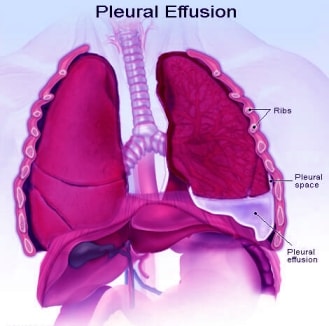Pleural Effusion Research on Mesothelioma Tumors
By Kathy Cooke. 2nd December 2016
Pleural Effusion is a buildup of fluid in the area between the layers of tissue that line the lungs and the chest cavity. This can be either Transudate - from heart failure or cirrhosis, or Exudate pleural effusions which usually more serious and difficult to treat.

Most mesothelioma patients will experience pleural effusion, which leads to pains in the chest and shortness of breath. This was only considered to be a side effect of the cancer which can be drained away.
However, recent research at a hospital in Perth, Western Australia suggests that this build up of fluid may be biologically active and may play a role in the progression of Pleural Mesothelioma.
Malignant Mesothelioma and Pleural Effusion
In tests, the researchers in Australia took fluid samples from the pleura of 150 patients, including 56 patients with mesothelioma. After diluting the pleural fluid samples, researchers applied the resulting fluid to samples of different laboratory-grown mesothelioma cell lines.
The results were that in 5 mesothelioma cell lines the pleural fluid consistently stimulated cell proliferation and in another 6
mesothelioma cell lines the fluid also induced cell migration. Whether the fluid was applied to mesothelioma cells from the same person who produced it, or to a different cell sample, the results were similar.
The researchers then applied the fluid to mesothelioma cells that were being treated with Pemetrexed and cisplatin, commonly used as chemotherapy treatment of the disease. In the 3 mesothelioma cell lines tested, the lung fluid significantly protected mesothelioma from Pemetrexed / Cisplatin induced cell death, suggesting that pleural effusion may actually contribute to the resistance of the treatment of mesothelioma.
The team also injected either the pleural fluid or saline into live mice that had been infected with mesothelioma and discovered that the mesothelioma tumors exposed to the fluid grew significantly faster than those exposed to the saline.
The researchers concluded that further investigation is required to determine the full extent that pleural effusion may have in the "potent biological capabilities” in Pleural Mesothelioma.

Author
Kathy Cooke MA. BSc
Cancer consultant and advisor
Kathy has worked in the cancer field for over 30 years. She was course leader for the MSc in Radiotherapy and Oncology at University of Hertfordshire. Then pre-treatment radiotherapy manager at the Cromwell Hospital in London and Partnership Quality Lead for Macmillan Cancer Support.. Read more >













